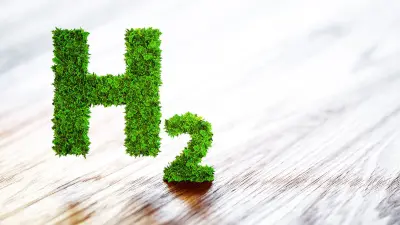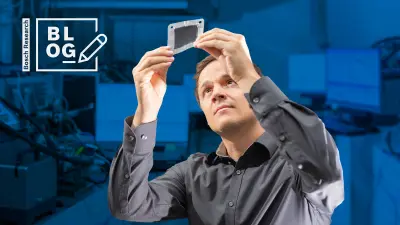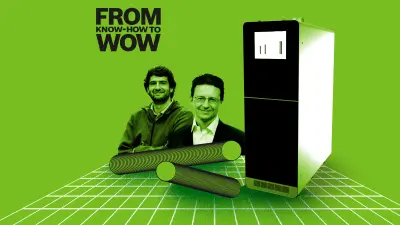Bosch Research paves the way for hydrogen technologies
Hydrogen: Key element for climate protection

Natural gas, oil and coal have no place in the energy system of the future. They must be replaced by CO₂-neutral alternatives. In many cases, green hydrogen can do this. Provided that no pure hydrogen escapes into the atmosphere, no greenhouse gas emissions are produced during use as the energy contained comes from renewable sources — the hydrogen is produced by electrolysis using green electricity. This turns the fuel into a chemical store for wind or solar energy. Bound in hydrogen, renewable energy can also be transported over long distances. All this means that hydrogen plays a key role in climate protection. Bosch Research is researching and developing the necessary hydrogen technologies for this — with a focus on three key areas:
- Researching the production of hydrogen using electrolysis,
- Further developing mobile fuel cells for car and commercial vehicle applications and
- Researching and further developing solid oxide fuel cells for stationary use — for providing a decentralized energy supply for industry, computer centers, buildings or entire districts.
Producing green hydrogen: Research on electrolysis
Water electrolysis uses electricity to split water into its hydrogen and oxygen components. An electrolyte between the hydrogen and oxygen sides separates the gases and allows the ion exchange which is needed for the reaction. There are various types of electrolytes, i.e., liquid or solid substances with ionic conductivity, according to which the systems are classified: proton exchange membrane (PEM), anion exchange membrane (AEM), alkaline electrolysis (AEL) and solid oxide electrolyzer cell (SOEC). In order to build compact systems and use the voltages which are typical in the electricity system, several hundred cells are combined by placing them on top of each other to form a so-called stack. The stack is operated with additional components as part of an overall system.
Bosch Research has been researching electrolysis since 2012. Due to the great relevance of the technology for climate protection, Bosch decided in 2022 to enter into product development for hydrogen electrolysis and established a new business division for this purpose. Bosch initially focused on developing a 1.25 MW PEM electrolysis stack. At the same time, a “smart electrolysis module” is being developed. It combines the PEM electrolysis stack with a control unit, power electronics and sensors.
Bosch will work with partners during development, initially supplying the PEM electrolysis stack and, downstream, the smart electrolysis module to manufacturers of large-scale hydrogen production facilities and industrial service providers. The results of Bosch's electrolysis research have paved the way for this market entry and continue to play a role in the development and production of the components.
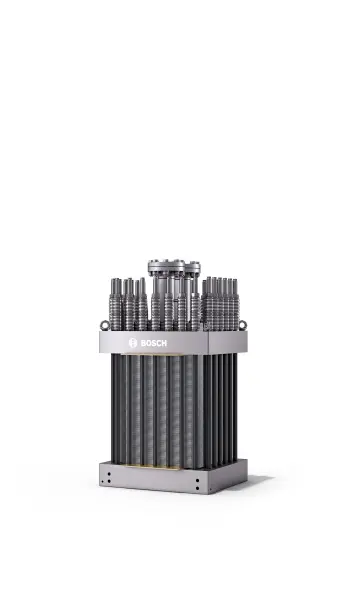
Fuel cells for climate-neutral mobility
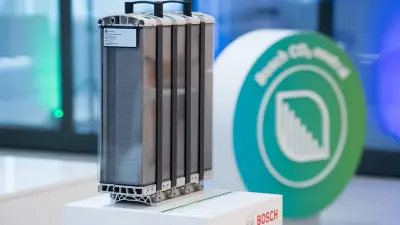
In addition to producing hydrogen using electrolysis, Bosch Research is also focusing on actually using the hydrogen: We are researching fuel cells for mobile and stationary use. They are an important building block for the energy transition and the most efficient way of converting the renewable energy bound in hydrogen back into electricity. They are therefore of great importance in mobility. Given the high energy density of hydrogen compared to batteries, they ensure that electric vehicles have long ranges – with short refueling times. The advantage here is that Bosch can manufacture all the components for the fuel cell system itself, from the core (the stack) to the air compressor and control unit. This means that both hardware and software expertise is fully available at Bosch. This gives us numerous starting points for innovative ideas in research. One key area of research is a fully optimized design and operating strategy, taking into account the wide-ranging system interactions. One of the major challenges is to make the fuel cell systems as small as possible while remaining flexible for various future applications and technological advancements.
The fuel cells themselves are another key area of research. This primarily involves research into new, future-proof materials to optimize fuel cell performance, service life and costs.
Stationary fuel cells with high efficiency

Fuel cells are also ideal for stationary and decentralized power generation: they can supply city districts, computer centers or industrial plants with environmentally-friendly electricity and heat. Bosch favors solid oxide fuel cell technology (SOFC) here. At Bosch Research and Bosch SOFC, we can thus achieve an electrical efficiency of around 60% and an overall efficiency up to 90%. Furthermore, the SOFCs can be used in a decentralized, scalable manner. Until hydrogen is available in sufficient quantities, the fuel cells can also be operated with natural gas or biomethane.
Bosch Research plays a significant role in industrializing the SOFC system. We are working intensively to optimize the functional and service life of SOFCs: we analyze individual cells, develop innovative processes for the production of functional layers within the cell and investigate the corrosion resistance of the steels used in the fuel cell stack. We are also developing a high-speed laser drilling process for the metal substrate, the carrier of the cell, and are operating a dynamic and modulable microgrid demonstrator on the system level at the Bosch Research site in Renningen. This includes ten SOFC units and the associated power electronics.
Our research work provides the basis for manufacturing a large number of the components used ourselves, right through to the core of the system, the SOFC stack, which we are developing with the help of our partner Ceres. Bosch can thus supply complete systems for the fuel cells used in stationary applications too. We benefit from our many years of experience with complex manufacturing processes and demanding materials, for example when processing ceramics. For this reason, a separate unit for the production and industrialization of stationary fuel cells — Bosch SOFC — was established in 2021, based on the research work carried out by Bosch Research. The results of Bosch research are taken into account during all development work.

